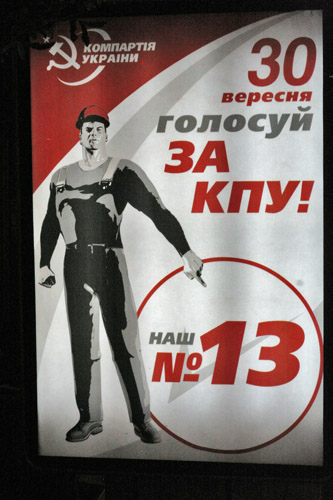
The tomorrow's vote is being presented to the public as the solution to the ongoing political crisis brought about by feuding between President Viktor Yushchenko and Prime Minister Viktor Yanukovych. This expectationcan be disappointinig. Ukraine’s political problems run deeper than another set of elections can possibly fix. President Yushchenko knows that the root cause of the friction between him and the prime minister is a struggle for power and authority in Ukraine’s political system.
The real battle will take place between the Party of Regions, headed by Yanukovych, the Our Ukraine – National Self-Defense coalition supported by Yushchenko and Yulia Tymoshenko’s eponymous bloc. And the two established parties are unlikely to do well in the voting. The Socialists may not even top the 3-percent cutoff to enter parliament, and the Communists, currently rejoicing at the woes of their former adherent, now Socialist leader Oleksandr Moroz, may not do much better.
Yanukovych’s personal slogan – “What Yanukovych says, he does” – harks back to Kuchma’s main theme in his race for the presidency in 1994, when serving President Leonid Kravchuk was lampooned as “all words,” while Kuchma was the “man of action.”
The Party of Regions is feeling confident, and for good reason, writes Ivan Lozowy in
Transitions Online.
A “grand coalition” between these two antagonists looks likely to be short-lived and the same goes for a Tymoshenko government. One result looks certain: people will soon start talking about yet another election.
Ukraine, traditionally passive in its politics, has been mobilised by the young democracy activists and will never be the same again. Some analysts are whispering about the possibility of a worst-case scenario – the Party of Regions garnering more than half the seats in parliament together with the communists, allowing them to form a government on their own. The two parties have worked as solid coalition partners in the Yanukovych-led government.
Why to vote again for Tymoshenko?
Vera Gerasynenko, 56, who was attending the pro-Yushchenko rally with her daughter Maria, 21, said to AFP that the choice on Sunday was between Ukraine's entry into Europe and being swallowed by giant neighbour Russia.
"Russia needs Ukraine as their colony. They're an empire," she said, describing Yanukovych as "a criminal, a sick man."
Why to vote for Yanukovych?
"Tymoshenko has the character of a Nazi. Ukraine will turn into a second Yugoslavia if she takes power," he said.
For Ian Traynor, a
US campaign behind the turmoil in Kiev Because while the gains of the orange-bedecked "chestnut revolution" are Ukraine's, the campaign is an American creation, a sophisticated and brilliantly conceived exercise in western branding and mass marketing that, in four countries in four years, has been used to try to salvage rigged elections and topple unsavoury regimes. This type of campaign was first used in Europe in Belgrade in 2000 to beat Slobodan Milosevic at the ballot box: funded and organised by the US government, deploying US consultancies, pollsters, diplomats, the two big American parties and US non-government organisations.
Officially, the US government spent $41m organising and funding the year-long operation to get rid of Milosevic from October 1999. In Ukraine, the figure is said to be around according to
TheGuardian. Stickers, spray paint and websites are the young activists' weapons.
photo by Carpetblogger









